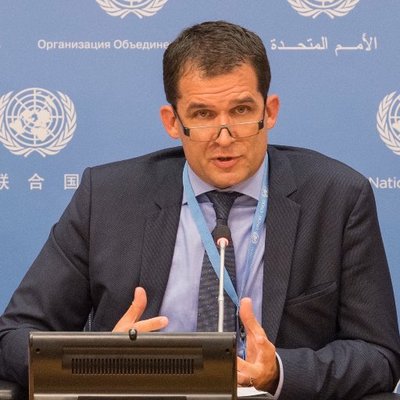UN expert on torture sounds alarm again: Julian Assange’s life may be at risk
GENEVA (1 November 2019) – The UN Special Rapporteur on torture, Nils Melzer, has expressed alarm at the continued deterioration of Julian Assange’s health since his arrest and detention earlier this year, saying his life was now at risk.
Mr Assange was sent to a UK high-security prison on 11 April 2019 where he continues to be held in connection with a US extradition request on espionage charges for having exposed evidence for US war crimes and other misconduct in Iraq and Afghanistan. “While the US Government prosecutes Mr Assange for publishing information about serious human rights violations, including torture and murder, the officials responsible for these crimes continue to enjoy impunity,” said Melzer.
The Special Rapporteur and his medical team visited the imprisoned Wikileaks founder in May and reported that he showed “all the symptoms typical for prolonged exposure to psychological torture” and demanded immediate measures for the protection of his health and dignity.
“However, what we have seen from the UK Government is outright contempt for Mr Assange’s rights and integrity,” Melzer said. “Despite the medical urgency of my appeal, and the seriousness of the alleged violations, the UK has not undertaken any measures of investigation, prevention and redress required under international law.”
Under the Convention against Torture, States must conduct a prompt and impartial investigation wherever there is reasonable ground to believe that an act of torture has been committed. “In a cursory response sent nearly five months after my visit, the UK Government flatly rejected my findings, without indicating any willingness to consider my recommendations, let alone to implement them, or even provide the additional information requested,” the UN expert said.
As predicted by Melzer, shortly after the Special Rapporteur’s visit, Mr Assange had to be transferred to the prison’s health care unit. “He continues to be detained under oppressive conditions of isolation and surveillance, not justified by his detention status,” said Melzer, adding that having completed his prison sentence for violating UK bail terms in 2012, Mr Assange was now being held exclusively in relation to the pending extradition request from the United States.
“Despite the complexity of the proceedings against him led by the world’s most powerful Government, Mr Assange’s access to legal counsel and documents has been severely obstructed, thus effectively undermining his most fundamental right to prepare his defence,” said Melzer.
“The blatant and sustained arbitrariness shown by both the judiciary and the Government in this case suggests an alarming departure from the UK’s commitment to human rights and the rule of law. This is setting a worrying example, which is further reinforced by the Government’s recent refusal to conduct the long-awaited judicial inquiry into British involvement in the CIA torture and rendition programme.
“In my view, this case has never been about Mr Assange’s guilt or innocence, but about making him pay the price for exposing serious governmental misconduct, including alleged war crimes and corruption. Unless the UK urgently changes course and alleviates his inhumane situation, Mr Assange’s continued exposure to arbitrariness and abuse may soon end up costing his life.”
In his urgent appeal to the UK Government, the Special Rapporteur strongly recommended that Mr Assange’s extradition to the United States be barred, and that he be promptly released and allowed to recover his health and rebuild his personal and professional life.
Source: www.ohchr.org/EN/NewsEvents/Pages/DisplayNews.aspx?NewsID=25249&LangID=E from 1 November 2019
“I‘m dying. Slowly, but unstoppable.“
“I‘m dying. Slowly, but unstoppable. I am exhausted and have lost much weight. The solitary confinement in Belmarsh kills me. There is only sparse contact with the outside world. All because I made war crimes public. To open the eyes of society and show what governments are keeping quiet about. I‘m dying. And I fear, as well as the press freedom and democracy with me.“
Julian Assange from 11 November 2019

Nils Melzer
Since November 2016, the Swiss international law expert Prof. Dr Nils Melzer has been the Special Rapporteur on Torture and thus an expert on the so-called Special Procedures of the Human Rights Council. The Special Procedures experts work on a voluntary basis; they are not UN employees and receive no salary for their work. They are independent of any government or organisation and serve in their individual function. Earlier, Nils Melzer worked for twelve years at the International Committee of the Red Cross (ICRC) in various crisis regions as a delegate, deputy head of mission and legal advisor. In addition to his UN mandate, he holds a chair in international humanitarian law at the University of Glasgow and teaches at the Geneva Academy of International Humanitarian Law and Human Rights.